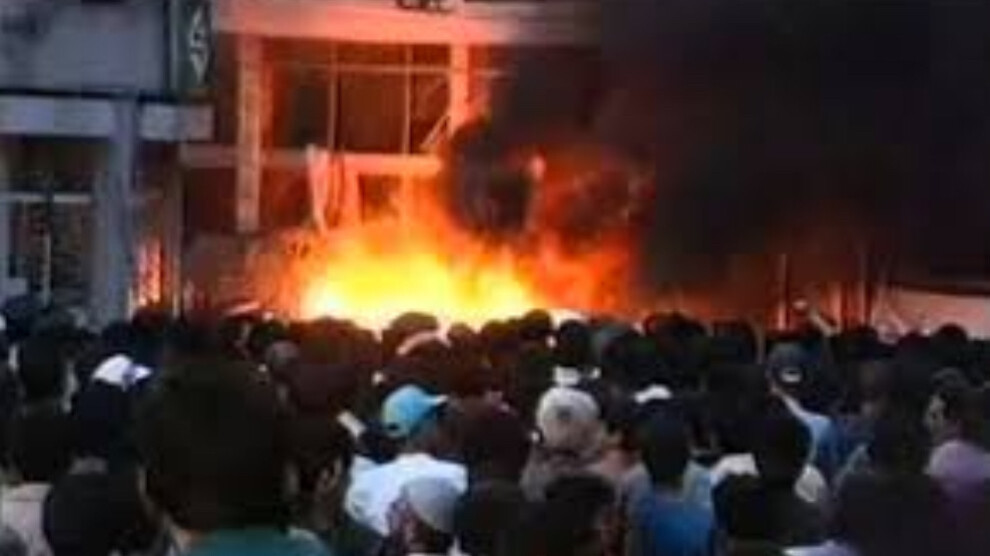32 years ago, the Madımak massacre
On July 2, 1993, 33 people, mostly of Alevi faith, were killed in an Islamist-nationalist pogrom at the Madımak Hotel in Sivas. Victims and survivors are still fighting for justice.
On July 2, 1993, 33 people, mostly of Alevi faith, were killed in an Islamist-nationalist pogrom at the Madımak Hotel in Sivas. Victims and survivors are still fighting for justice.

On July 2, 1993, 33 people, including artists, intellectuals, and two employees, were burned to death or suffocated when an Islamist mob threw incendiary devices into the Madımak Hotel in the central Anatolian city of Sivas. On that day, as in previous years, a cultural festival was held in honor of Pir Sultan Abdal, a spiritual figurehead of the Alevi community. Abdal was a 16th-century folk poet and freedom fighter who expressed the social, cultural, and religious sentiments of his fellow citizens in his poems and was executed for rebelling against Ottoman rule.
The victims: poets, thinkers, singers, and folklore dancers
The festival guests staying at Madımak were mainly Alevi poets, thinkers, singers, and folklore dancers, but also critical intellectuals of other faiths. Among them was the writer Aziz Nesin, who narrowly survived the pogrom. The avowed atheist was hated by Islamists because he supported the publication of Salman Rushdie's “Satanic Verses.” The book is still considered heretical by religious fanatics today.
“This is the hellfire in which the infidels will burn”
After Friday prayers, 15,000 fanatics marched from three mosques through the city and finally to the Madımak Hotel. They chanted, "Long live Sharia law! Down with secularism!" Throwing stones and incendiary devices, the crowd surrounded the festival participants. The guests desperately tried to get help, calling the headquarters of the Social Democratic People's Party (SHP), which was part of Tansu Çiller's government. They asked Deputy Prime Minister Erdal Inönü to free those trapped inside. But his request to the army and police to protect the hotel and help those under siege was ignored. From the ranks of the attackers, cries of “This is hellfire! The fire in which the infidels will burn” could be heard.
Army withdraws, police help attackers
The events in Sivas were broadcast live on state television for over eight hours. The footage showed, among other things, how isolated police officers helped the crowd and how an advancing military unit withdrew without helping the people in Madımak. The images from that day also show Islamists storming the hotel, pouring gasoline, and setting it on fire. The flames quickly spread to the third floor because the building was made of wood. The people trapped inside were unable to escape from the burning hotel because the angry mob blocked their way and cheered on the fire. Aziz Nesin and more than forty other people finally managed to escape to a neighboring building via the roof. Many of them were seriously injured. In the turmoil, officers shot and killed two attackers.
No legal or political reckoning
Even after more than three decades, the Sivas massacre has not been addressed either legally or politically. To this day, Alevi associations are demanding an independent investigation into the crimes of July 2, 1993, but punishment for the perpetrators remains a distant prospect. Although there have been show trials against individual perpetrators – of the approximately 15,000 people involved in the pogrom, security forces arrested only 190, and only 130 were convicted, mainly to symbolic prison terms. Many of the perpetrators still enjoy freedom today. And not only in Turkey. Some of those involved in the pogrom fled to Germany at the time, where they were granted asylum. Despite international arrest warrants, they were never extradited. The German judiciary also refused to prosecute the three men for their involvement in the pogrom under the principle of universal jurisdiction. Some of them even have German citizenship.
Case pending before the Constitutional Court
In September 2023, the last remaining case in Turkey related to the Sivas massacre was also dismissed due to the statute of limitations. Only the Constitutional Court could now provide a spark of justice in the legal sense. Relatives of the victims had filed a lawsuit demanding that the massacre be classified as a crime against humanity and thus declared a crime with no statute of limitations. Ten years had to pass before the General Assembly of Turkey's highest court finally decided in February 2024 to take up the case.
However, the complainants do not have much hope left. In January 2023, the Constitutional Court ruled that the perpetrators could not be considered terrorists, as no membership of a terrorist organization had been proven. This means that the terrorism law does not apply in their case. The harsher life sentences imposed on some of the perpetrators remained in place, but the reassessment allowed for the early release of selected convicts. As a result of this decision, at least 17 of the 23 convicts have been released from prison since the end of February. Justice continues to be delayed.